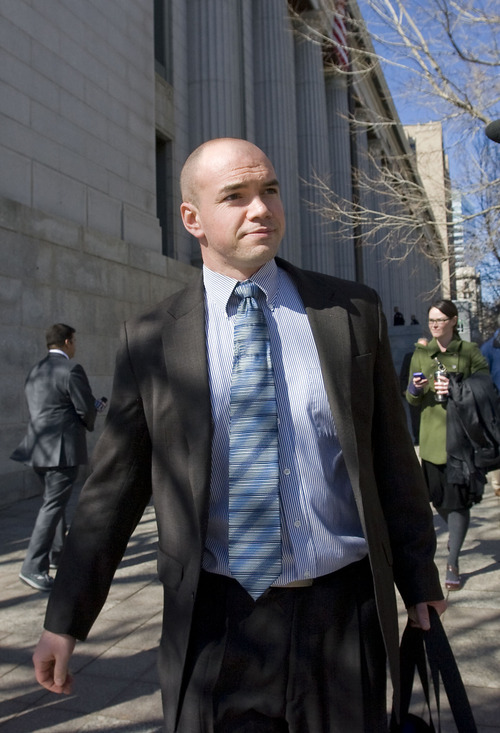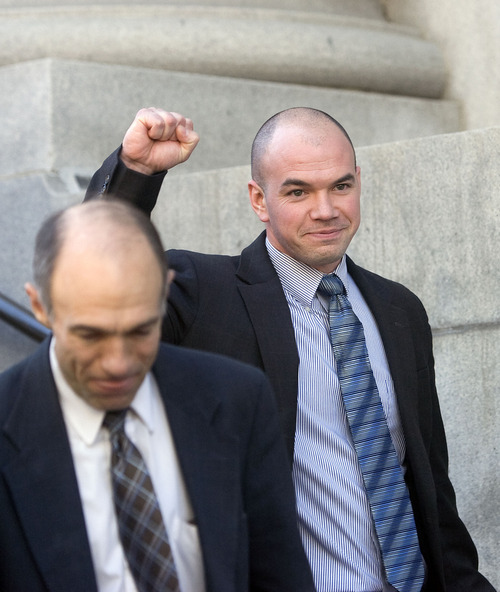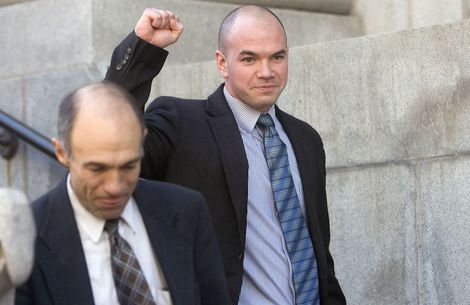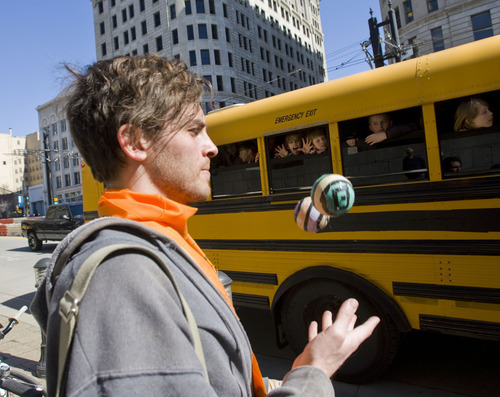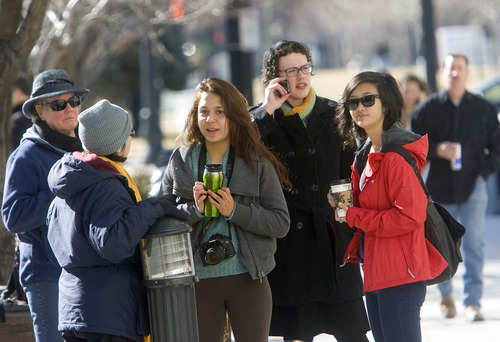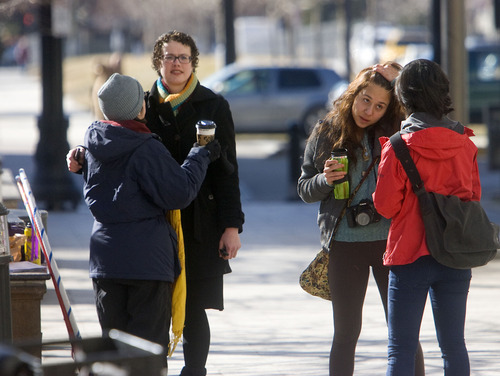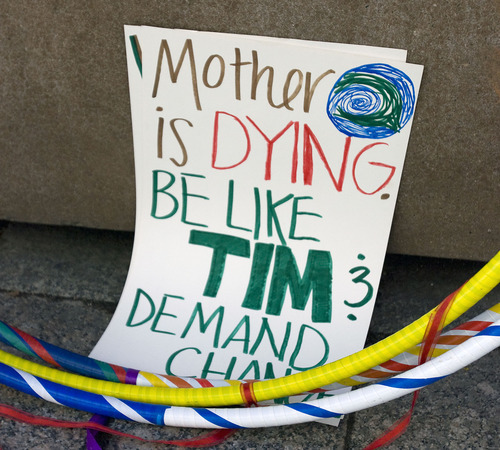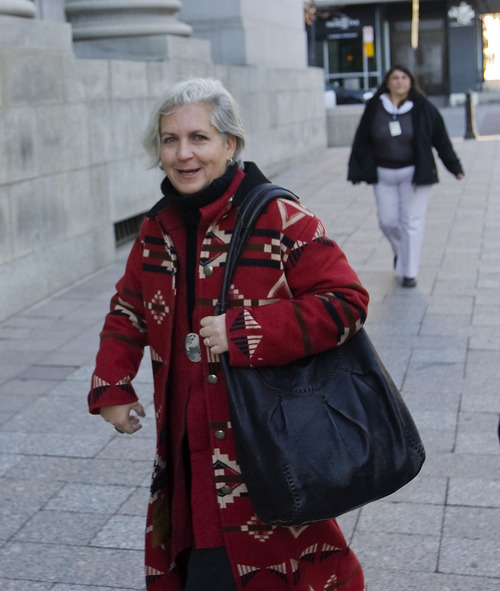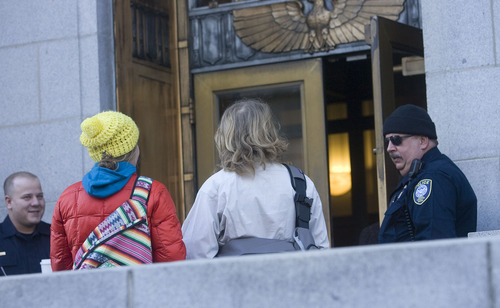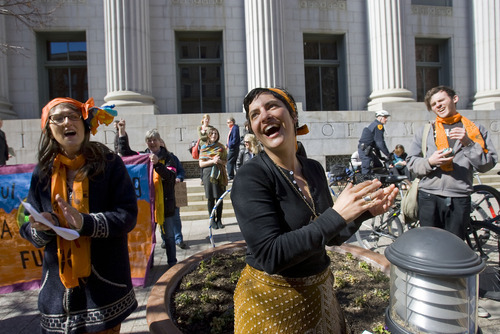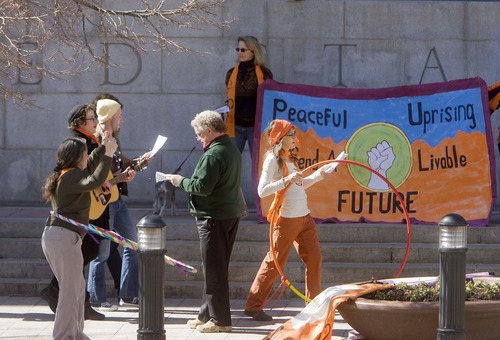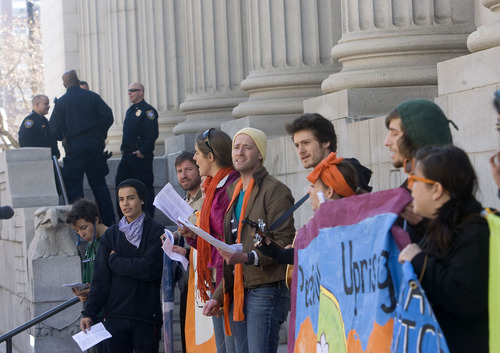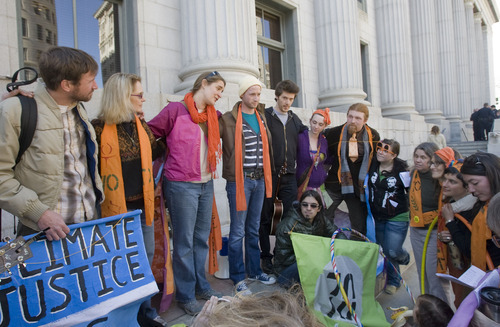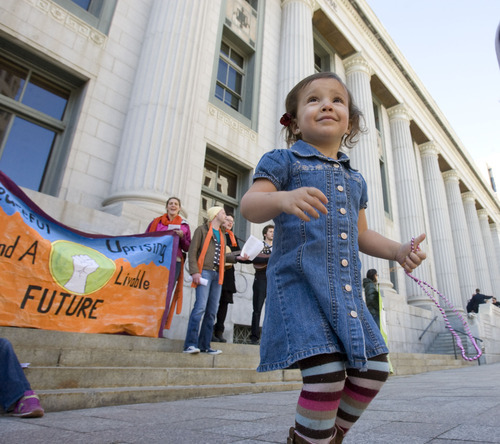This is an archived article that was published on sltrib.com in 2011, and information in the article may be outdated. It is provided only for personal research purposes and may not be reprinted.
If they didn't know it already, jurors in Tim DeChristopher's trial for crashing a federal oil and gas lease auction now understand that he did so to fight climate change.
Although the judge previously ruled that the defense could not argue that DeChristopher felt that he had to act to save the environment, defense attorney Ron Yengich managed to let jurors know it Tuesday.
When questioning a Bureau of Land Management agent who interrogated DeChristopher after the unemployed college student won 14 Utah leases worth $1.8 million by outbidding energy developers at the December 2008 auction, Yengich referred to what his client said in that interview. It included DeChristopher's admission that he had no money to pay, and his assertion that he was part of a larger environmental movement that believed this auction in the last days of the Bush administration endangered the Earth.
"He thought that this whole process was a threat to him and his generation," Yengich said.
Assistant U.S. Attorney John Huber objected, and U.S. District Judge Dee Benson shut down Yengich. Later, after the judge ordered the jury out of the room, Yengich said he was entitled to discuss the complete statement that DeChristopher had made that day to Special Agent Dan Love — including about his environmental fears.
Benson disagreed.
"We're not here about why he did it," the judge said, holding the line against the jury hearing more of DeChristopher's motive. "We're here about whether he did it."
At the trial's conclusion, which could come Wednesday, the judge may yet instruct jurors to disregard Yengich's comment. But, for that moment Tuesday, they heard what DeChristopher had said drove him.
The 29-year-old eco-activist faces two felony counts and up to 10 years in prison if convicted.
In other testimony Tuesday, government officials said DeChristopher appeared unlike usual bidders because he was younger, dressed casually and didn't come with maps and a laptop full of research. Love added that DeChristopher at first simply drove up the price on other bidders before apparently surprising himself by winning a lease.
The showdown over DeChristopher's statements foreshadowed an afternoon in which the defense tried to find wiggle room with a judge who so far has rejected arguments that strayed beyond the facts of the auction and DeChristopher's bogus bids.
For a while Tuesday it appeared Yengich had found an opening to discuss the auction's legality despite Benson's previous decision that it wasn't relevant. Another federal judge temporarily halted the sales after the auction, and the Obama administration pulled 77 of the parcels back for closer environmental scrutiny — facts the defense argues help justify DeChristopher's defiance.
When Huber asked the BLM's Utah director for land and minerals, Kent Hoffman, about how the agency prepared for the auction, Hoffman responded that, among other things, officials completed environmental analyses of affected resources. Because some of those analyses are what later were argued to be flawed, and because Hoffman had mentioned them, the defense insisted it was now free to ask him about them and, in effect, the auction's legality.
With the jury absent, Benson at first agreed that the prosecution had "opened the door." But the judge later said he had read the transcript and didn't think Hoffman went far enough to justify discussing whether the auction was flawed.
Huber said he had asked the question only to help illustrate how much in wages the agency wasted on the auction that DeChristopher thwarted — about $140,000, Hoffman said. Benson said he would allow defense attorney Pat Shea to ask questions along those lines when he completes the cross-examination Wednesday.
In the government's opening statement Tuesday, Assistant U.S. Attorney Scott Romney said DeChristopher went beyond a legal protest that occurred outside the auction.
"Unlike those demonstrators who focused their attentions within the boundaries of the law," Romney said, "Mr. DeChristopher, as you will see over the course of this trial, chose to engage in a criminal form of activism."
The defense reserved its opening statement until after the government finishes its case.
In cross-examining witnesses, Yengich sometimes focused on whether BLM employees provided DeChristopher with sufficient information about criminal penalties involving fraudulent bidding.
Yengich pointed out that good-faith bidders previously have failed to pay for parcels. The BLM even has a name for them: "bid walkers." In those cases, former BLM employee Teresa Catlin said, the agency would "pursue the remaining financial obligation."
Special Agent Love testified that his "biggest concern [that day] was that somebody would cross the line from a lawful demonstration to an illegal disruption."
Love had been outside with the demonstrators and noticed a few of them had moved into the auction room in Salt Lake City. DeChristopher, a twentysomething in a knit hat and carrying a bidding paddle, caught his attention.
Asked why BLM officials didn't intervene as soon as suspicions arose about DeChristopher, Love said, "I don't act on just pure hunch or suspicion. I actually wait until I have the elements or good probable cause."
But DeChristopher's actions became more suspicious as the auction progressed, Love said. DeChristopher was using a wireless device and looking toward the back of the room, not paying attention to the auction itself, leading Love to believe something was being coordinated.
Love called for uniformed officers in hopes of creating a deterrent.
DeChristopher started bidding, raising the card just above his shoulder. The action lessened Love's concerns, the agent testified.
"He clearly had me fooled for a period of time," the agent said.
With bidding generally occurring between smaller groups — often just two parties — DeChristopher would wait until one bidder dropped out and then bid on the parcel, driving up the price, Love said. But, at some point, DeChristopher made a bid that was not matched.
"He appeared to have a shocked look on his face when he won that first bid," Love said. "Mr. DeChristopher kind of slumped ... and looked at the ground and had a brief conversation [with his roommate]."
The total bid was for about $500, Love said.
DeChristopher later won a parcel for about $25,000. DeChristopher's roommate chuckled, Love said.
"At this point, simply stated, he was in it to win it," Love testified.
As DeChristopher continued to bid, another bidder, turned to look back at DeChristopher, who stared at the man and smirked, Love said. It was "enough for me to know there was a problem."
Love asked the auctioneer to take a break so he could have a "low-key" interview with DeChristopher. The agent said he spoke with DeChristopher, asking him if he had read the contract and if he had the ability to pay for the parcels.
"His response," Love testified, "was he was unsure and wanted to know how much trouble he was in ... and further stated he was prepared to deal with the consequences of that."
When Love told DeChristopher the total bids amounted to nearly $1.8 million, "he laughed."
Yengich began to make a case that his client was treated differently than other bidders.
"Did you walk over to any of them and say, 'Are you a bona fide bidder?' " Yengich asked Love. "You don't know whether any of those other people who bid and didn't win anything also didn't have the wherewithal to pay."
Protests thin out
Outside Salt Lake City's federal courthouse Tuesday morning, quiet prevailed — unlike Monday, when hundreds of protesters sang, chanted and marched in support of DeChristopher.
As the trial began in earnest, only a few supporters trickled inside the courthouse Tuesday.
By afternoon, though, a few dozen had assembled to sing and chant as DeChristopher exited the courthouse. —
The government's witnesses
On Tim DeChristopher's entry • Diane McComb, a Bureau of Land Management employee who sat at the registration desk during the auction, testified that DeChristopher arrived later than most bidders.
"He came in. He came up to the table. I said, 'Are you a bidder, an observer or a member of the media?' " McComb recalled. "He said he was a bidder."
DeChristopher filled out a registration form, and McComb handed him Paddle No. 70.
On DeChristopher's appearance • Scott Swanson, chief ranger for the BLM in Utah at the time of the auction, said DeChristopher attracted his suspicion.
But Swanson said he didn't speak to DeChristopher prior to him placing any bids.
"He didn't look like a bidder," Swanson said.
"He was younger than most of the bidders. Most of the bidders are middle-aged. They're generally dressed in business or business-casual attire. He was wearing a lot more casual-type dress, with a knit cap and a casual-type bag."
On DeChristopher's intentions • "He was looking for a disruption," testified BLM Special Agent Dan Love, who questioned the defendant at the auction. "Whether it was a speech or a disruption, he realized with [the police presence in the room] that was not going to have the type of impact he was looking for and he could have a much greater impact with the 70 placard."
On oil and gas leasing • "It's in the public interest," said the BLM's Utah director for lands and minerals, Kent Hoffman, noting that half the proceeds go to the state and half to the U.S. Treasury. Defense attorney Pat Shea later said he hopes to ask Hoffman on Wednesday about some of leasing's downsides, though the judge reaffirmed he won't let this be a trial about environmental protection. —
Online • DeChristophertranscripts
O Read transcripts at sltrib.com of the testimony of Tim DeChristopher, who is expected to take the stand Wednesday.


